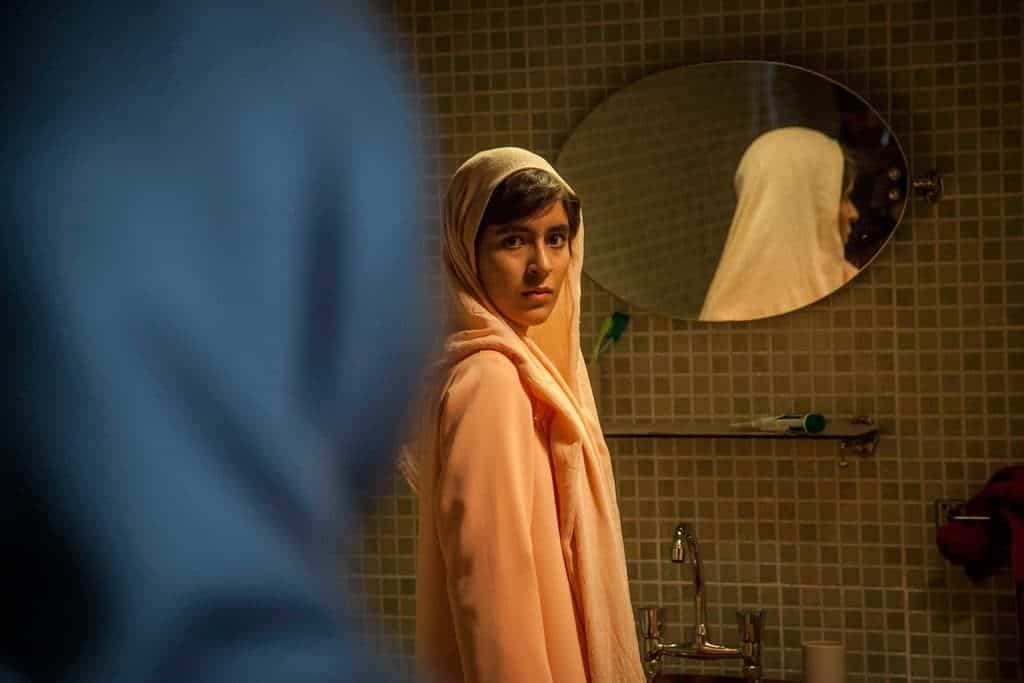
Director: Sadaf Foroughi
MPAA Rating: NR
Run Time: 102 Minutes
We meet our titular protagonist, Ava, in an all-too-familiar situation for her brief 13-year existence: at ends with her overprotective and belittling mother as she drives her to school. What we fail to see in director Sadaf Foroughi’s prologue to her forceful exploration of intermittent youthful defiance is the mother herself, kept noticeably out of frame as Foroughi tells the majority of his story with long takes of obstructive angles and deliberately obscure perspectives.
Our point of view remains static, tilted toward the passenger door as the plucky Ava (Mahour Jabbari) bickers with the voice of her mother (Bahar Noohian), exits the vehicle and drifts into the escalating blur of the shot’s depth to meet up with her school friends. The symbolic weight of the cinematographic image, depicting an absentee mother watching her daughter drift away from her, is almost too powerful to lay onto the audience before a title card even hits, but let it be known AVA is not one to pull its punches in regards to the stirring sentiments of a mother-daughter relationship.
Cinema has had a recent Renaissance with maternal-themed bildungsromans – such as Great Gerwig’s ode to her Sacramento formative years, Lady Bird, and the quirky “aged rocker reconnects with estranged daughter” parable of the late Jonathan Demme’s Ricki and the Flash – but the conceit of these films is always the standardized moral of parenting being a two-way street, wherein a child and a parent teach one another.
AVA is more sour in its outlook and forces its protagonist to come to terms with the ineffectual and damaging role models that populate this transitory period of her short life. Her mother, rendered abusively authoritarian by Noohian’s chilling performance, frequently punishes her burgeoning independence and rebellion while denying her strictness or emotional unavailability was a contributing factor.

She’s a manipulative type who discourages her daughter’s passion in music as impractical and speaks to her teachers so she may be isolated from her friends, all while spouting a sanctimonious justification that she wants “what is best” for her daughter. Foroughi is deftly tuned into the fraught reality that the lack of a positive influence in her life (what with her mother being unreasonably cruel and her father being frequently absent) has Ava desultory.
The beautiful pacing of her film outlines this through a gradual slide of acting out that goes from expectantly innocent disobedience of lying to her parents to see a boyfriend to the more concerning acts, like her slicing open her hand during a lecture. I highlight this scene to relish an opportunity to praise Sina Kermanizadeh’s cinematography, which coldly fixes this scene on Ava’s face as the offending act lingers just out of frame and all of its meaning is seen in the pained winces of Jabban’s face.

AVA is completely composed of these static, penetrating shots into space that give off the air of stringent rules and authority in all the ways Ava finds herself decentralized in these compositions. While cutting us, as the audience, off from the easy intimacy of sharing Ava’s point of view consistently, it speaks to the greater idea of how little control she has in the trajectory of her life, and due to Foroughi’s direction, it comes through crystal clear. Imbued into her push toward the edge by the authority figures is a frequent appeal to traditions and expectations of Iranian society and their limits when viewed through the eyes of a growing woman. Foroughi’s script has many of its dramatic highs at these moments of realness, most likely informed from experience.
The gutting moment when Ava’s mother brings up another mother being divorced to shame her for not watching the children close enough (once again, staged on a fire escape and shot from across the street) has an impact that carries through the whole film. I don’t feel confident enough about the subject to evaluate how Foroughi is using the expectations of contemporary Iranian society to pick apart its understanding of child-rearing, but even if you don’t know the specifics, the emotions most certainly translate without issue.

In a final masterstroke, Foroughi — having written Ava as being directionless and lacking a purpose — seems to call back to the final shot of Francois Truffaut’s The 400 Blows, where Antoine Doinel, having escaped his school, stares into the camera in cinema’s most famous freeze frame. The difference here is Ava’s expression is no mystery after she leaves her school during her exam and looks straight into the camera — one of the few close-ups in the film.
Hers is a pained expression that reads like an appeal to the audience, which, in my speculation, is her lamenting her lacking agency and her concern for her future in the world she is living in. Foroughi proves herself to be unafraid to confront her audience with her subject even after forcing them to keep their distance for the full runtime. I cannot say that Ava will be like Doinel and have his life extrapolated into a film series, but I can only hope that Foroughi will find ways to keep telling stories because her first attempt shows a talent with an ensured future.






